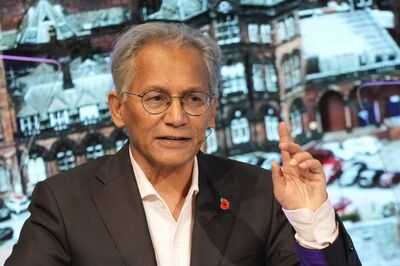BBC chairman Samir Shah has broken his silence after director-general Tim Davie confirmed he was stepping back from the corporation. Mr Shah said it was "a sad day for the BBC" after both Mr Davie and CEO of News Deborah Turness quit the broadcaster. Their resignations followed a wave of public outcry about impartiality at the taxpayer-funded corporation, after an internal dossier exposed damning editorial practices.
The dossier, compiled by former standards advisor Michael Prescott, revealed concerns over the manipulation of a Donald Trump speech in a Panorama documentary and allegations of skewed reporting on the Israel-Hamas war. Mr Shah praised Mr Davie as "an outstanding director-general" who had "propelled the BBC forward with determination, single-mindedness and foresight" in a statement shared after the news broke. "He has had the full support of me and the board throughout," he added. "However, I understand the continued pressure on him, personally and professionally, which has led him to take this decision today."

"Tim has given 20 years of his life to the BBC," Mr Shah continued. "He is a devoted and inspirational leader and an absolute believer in the BBC and public service broadcasting.
"He has achieved a great deal. Foremost under his tenure, the transformation of the BBC to meet the challenges of a world of unprecedented change and competition is well underway. Personally, I will miss his stamina, good humour and resilience and I will miss working with him. I wish him and his family the very best for the future."
In his leaving announcement, Mr Davie admitted to "mistakes" made under his tenure and said that as head of the organisation, he "has to take ultimate authority".
The BBC is expected to apologise on Monday following concerns about its impartiality and Culture Secretary Lisa Nandy said earlier today that she was "confident" bosses were treating the allegations with "the seriousness" they demand.
In a message posted on social media after Mr Davie resigned, Ms Nandy thanked him for his time at the helm and emphasised "the need for trusted news and high quality programming".
"The BBC is one of our most important national institutions," she added. "Every day, it tells the story of who we are - the people, places and communities that make up life across the UK.
"Now, more than ever, the need for trusted news and high quality programming is essential to our democratic and cultural life, and our place in the world.
"As a government, we will support the board as it manages this transition and ensure that the Charter Review is the catalyst that helps the BBC to adapt to this new era and secures its role at the heart of national life for decades to come."
Ms Nandy has previously indicated that Labour could introduce a "mixed funding model" for the BBC when its Royal Charter is renewed in 2027, potentially combining the existing licence fee with commercial and subscription revenues.
You may also like

Why has ECI yet to disclose male, female voter turnout in first phase: Tejashwi Yadav

Patrick Beverley revives old rumor, claims Carmelo Anthony allegedly declined Houston Rockets offer over Jeremy Lin

MCD bypolls: AAP, Congress, BJP announce candidates

F1 stewards issue statement on divisive Oscar Piastri penalty as Charles Leclerc disagrees

The beautiful European city where tourists have cleared out locals







